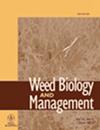下载PDF
{"title":"模拟草食对麻疯树(Jatropha gossypifolial .)生长的影响及其生物防治意义","authors":"N. Kumaran, C. Lockett, K. Dhileepan","doi":"10.1111/WBM.12159","DOIUrl":null,"url":null,"abstract":"Understanding the ability of invasive plants to compensate for herbivory damage is crucial for their management, but this has been poorly studied in weed biological control. Bellyache bush (Jatropha gossypiifolia L.) is an invasive weed and a target for biological control in Australia. To understand the response of bellyache bush to herbivory, we simulated herbivory damage, under field conditions, at a site in north Queensland. Two size classes, that is, seedlings and mature plants were subjected to either defoliation, shoot damage or a combination of both, and the damage was inflicted once, twice or thrice at 6–7 weeks interval. All herbivory types significantly reduced growth and biomass when herbivory was inflicted twice or thrice, whereas the single application had limited impact. Shoot damage alone and defoliation + shoot damage had a greater negative impact than defoliation treatment on plant height, basal stem diameter, the number of leaves, root length and the number of shoot tips produced while increasing the number of dead shoot tips. Defoliation alone and defoliation + shoot damage had a greater negative impact on the number of flowers and fruit pods produced than shoot damage. The greater negative effects noticed when herbivory was inflicted twice or thrice suggest that multivoltine biological control agents that can inflict shoot damage and defoliation should be sought for the biological control of bellyache bush. © 2018 Weed Science Society of Japan","PeriodicalId":23536,"journal":{"name":"Weed Biology and Management","volume":" ","pages":""},"PeriodicalIF":1.3000,"publicationDate":"2018-10-28","publicationTypes":"Journal Article","fieldsOfStudy":null,"isOpenAccess":false,"openAccessPdf":"https://sci-hub-pdf.com/10.1111/WBM.12159","citationCount":"4","resultStr":"{\"title\":\"Effect of simulated herbivory on bellyache bush (Jatropha gossypiifoliaL.) growth and implications for biological control\",\"authors\":\"N. Kumaran, C. Lockett, K. Dhileepan\",\"doi\":\"10.1111/WBM.12159\",\"DOIUrl\":null,\"url\":null,\"abstract\":\"Understanding the ability of invasive plants to compensate for herbivory damage is crucial for their management, but this has been poorly studied in weed biological control. Bellyache bush (Jatropha gossypiifolia L.) is an invasive weed and a target for biological control in Australia. To understand the response of bellyache bush to herbivory, we simulated herbivory damage, under field conditions, at a site in north Queensland. Two size classes, that is, seedlings and mature plants were subjected to either defoliation, shoot damage or a combination of both, and the damage was inflicted once, twice or thrice at 6–7 weeks interval. All herbivory types significantly reduced growth and biomass when herbivory was inflicted twice or thrice, whereas the single application had limited impact. Shoot damage alone and defoliation + shoot damage had a greater negative impact than defoliation treatment on plant height, basal stem diameter, the number of leaves, root length and the number of shoot tips produced while increasing the number of dead shoot tips. Defoliation alone and defoliation + shoot damage had a greater negative impact on the number of flowers and fruit pods produced than shoot damage. The greater negative effects noticed when herbivory was inflicted twice or thrice suggest that multivoltine biological control agents that can inflict shoot damage and defoliation should be sought for the biological control of bellyache bush. © 2018 Weed Science Society of Japan\",\"PeriodicalId\":23536,\"journal\":{\"name\":\"Weed Biology and Management\",\"volume\":\" \",\"pages\":\"\"},\"PeriodicalIF\":1.3000,\"publicationDate\":\"2018-10-28\",\"publicationTypes\":\"Journal Article\",\"fieldsOfStudy\":null,\"isOpenAccess\":false,\"openAccessPdf\":\"https://sci-hub-pdf.com/10.1111/WBM.12159\",\"citationCount\":\"4\",\"resultStr\":null,\"platform\":\"Semanticscholar\",\"paperid\":null,\"PeriodicalName\":\"Weed Biology and Management\",\"FirstCategoryId\":\"97\",\"ListUrlMain\":\"https://doi.org/10.1111/WBM.12159\",\"RegionNum\":4,\"RegionCategory\":\"农林科学\",\"ArticlePicture\":[],\"TitleCN\":null,\"AbstractTextCN\":null,\"PMCID\":null,\"EPubDate\":\"\",\"PubModel\":\"\",\"JCR\":\"Q3\",\"JCRName\":\"AGRONOMY\",\"Score\":null,\"Total\":0}","platform":"Semanticscholar","paperid":null,"PeriodicalName":"Weed Biology and Management","FirstCategoryId":"97","ListUrlMain":"https://doi.org/10.1111/WBM.12159","RegionNum":4,"RegionCategory":"农林科学","ArticlePicture":[],"TitleCN":null,"AbstractTextCN":null,"PMCID":null,"EPubDate":"","PubModel":"","JCR":"Q3","JCRName":"AGRONOMY","Score":null,"Total":0}
引用次数: 4
引用
批量引用
Effect of simulated herbivory on bellyache bush (Jatropha gossypiifoliaL.) growth and implications for biological control
Understanding the ability of invasive plants to compensate for herbivory damage is crucial for their management, but this has been poorly studied in weed biological control. Bellyache bush (Jatropha gossypiifolia L.) is an invasive weed and a target for biological control in Australia. To understand the response of bellyache bush to herbivory, we simulated herbivory damage, under field conditions, at a site in north Queensland. Two size classes, that is, seedlings and mature plants were subjected to either defoliation, shoot damage or a combination of both, and the damage was inflicted once, twice or thrice at 6–7 weeks interval. All herbivory types significantly reduced growth and biomass when herbivory was inflicted twice or thrice, whereas the single application had limited impact. Shoot damage alone and defoliation + shoot damage had a greater negative impact than defoliation treatment on plant height, basal stem diameter, the number of leaves, root length and the number of shoot tips produced while increasing the number of dead shoot tips. Defoliation alone and defoliation + shoot damage had a greater negative impact on the number of flowers and fruit pods produced than shoot damage. The greater negative effects noticed when herbivory was inflicted twice or thrice suggest that multivoltine biological control agents that can inflict shoot damage and defoliation should be sought for the biological control of bellyache bush. © 2018 Weed Science Society of Japan


